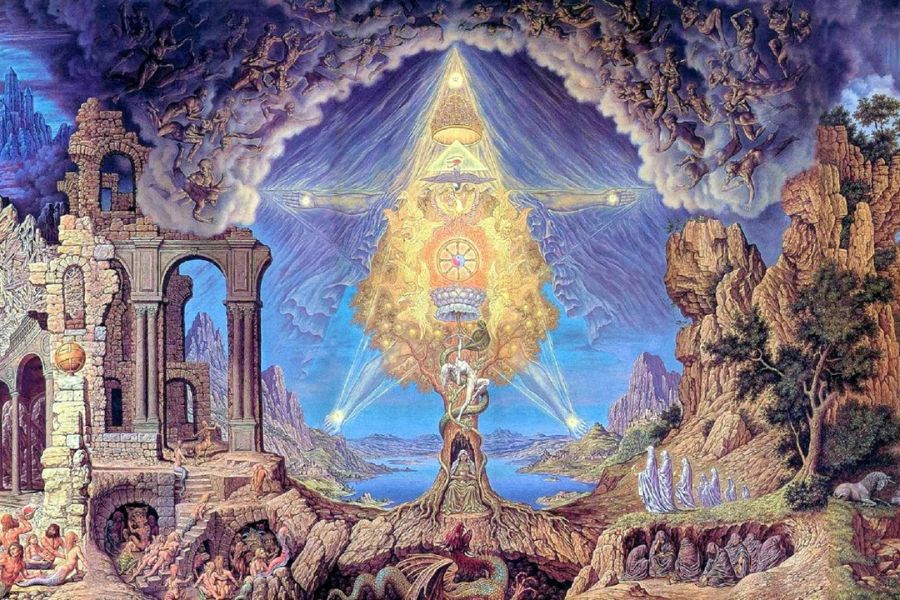When reflecting on the difficulties of communicating our worldview, we confront the inherent limitations of language. Even when we are well-versed in a subject or know our interlocutor intimately, conveying what we truly feel or think can be an almost insurmountable challenge.
This gap in communication is not simply a matter of words; it is a reflection of something deeper: the human psyche, with its complexities and contradictions, acts as a filter, distorting our perception of ourselves and others. This is a law of human nature, almost as precise as a mathematical equation. The clarity with which we understand others and ourselves largely depends on the mental and emotional state of each individual.
The renowned philosopher and mystic George Ivanovich Gurdjieff explored this issue in depth, delving into the nature of humanity and the processes that hinder us from achieving genuine self-knowledge. In his works, Gurdjieff warned that, despite often viewing ourselves as the "crown of creation," filled with grandeur and power, we are, for the most part, disconnected from our true essence. He questions: how can we consider ourselves complete or capable if our understanding of ourselves is superficial and frequently illusory? The search for self-knowledge, according to Gurdjieff, is a journey of demystification, where we must confront the harsh truth that we are not as grand or extraordinary as we imagine in our current form.
In everyday life, humans often perceive themselves as extraordinary beings, endowed with power, capacity, and importance. This myth of grandeur is fueled by a variety of external and internal influences. From childhood, we are conditioned to believe that we are special, that we have intrinsic value. However, as Gurdjieff pointed out, this value is often a social and psychological construct. The true nature of humanity, when observed impartially, reveals a collection of weaknesses, illusions, and distortions that make up our identity. The greatness we assign to ourselves is, in the end, largely detached from the reality of our everyday experience.
The real challenge Gurdjieff poses is one of brutal sincerity with oneself. He invites us to ask: Who are we, really? Rather than settling for the superficial certainty that we are important or grand, he challenges us to a rigorous examination of our lives. This examination, however, is not a search for comfort. On the contrary, it calls us to face the harsh reality that our identity, as we conceive it, is often an illusion built from external impressions and societal conditioning. When we ask ourselves who we truly are, we come face to face with an uncomfortable truth: we often do not know who we are.
Gurdjieff warned that the human mind, far from being an instrument of clarity and understanding, is often a machine of casual associations, functioning without clear direction or purpose. Human thought tends to follow erratic paths, driven by emotions and external influences, without true freedom or control. The mind feeds on past perceptions, creating a tapestry of memories and associations that blind us to the present reality.
From this perspective, Gurdjieff argued that to achieve genuine self-knowledge, we must break free from this automaticity. He emphasized the importance of cultivating full attention, capable of observing the mind without being controlled by it. Freedom, for Gurdjieff, is not a matter of external circumstances – it is not about having free time or material resources. True freedom arises when the mind and emotions cease to dominate our lives. To achieve this, we need to develop a new relationship with ourselves, with the world, and with who we truly are.
The search for self-knowledge, according to Gurdjieff, is a journey of transformation. It requires not only a keen look at who we are but also the willingness to question and revise everything we believe ourselves to be. This process is not easy, for it involves confronting the illusions and weaknesses that uphold our current identity. However, Gurdjieff believed that by becoming aware of our internal mechanisms, we could begin to deactivate these patterns that keep us trapped in a life without purpose or direction.
This process requires seriousness and continuous effort. The freedom we seek will not be achieved through superficial pleasures or fleeting distractions. It only emerges when we decide to look at ourselves with honesty and commitment. True freedom is the ability to act with clarity and intention, without being manipulated by the whims of the mind and emotions. To achieve this, constant self-observation and self-improvement are essential.
Gurdjieff challenges us to rethink our view of ourselves. Contrary to the common belief that we are the "crown of creation," he offers a more humble and realistic perspective: we are imperfect beings, often prisoners of our own illusions. Yet, this understanding should not lead us to despair but rather to motivation for true transformation. By attaining self-knowledge, we free ourselves from the automaticity that dominates us and begin to live in a more conscious and liberated manner.
Ultimately, the path to self-knowledge is the key to unlocking humanity's true greatness. It is not an external or superficial greatness, but an internal greatness that arises when we see ourselves without illusions and begin to live according to our true nature. This is the challenge Gurdjieff left us with, and the search for this transformation continues to be one of humanity's greatest and most noble endeavors.




















